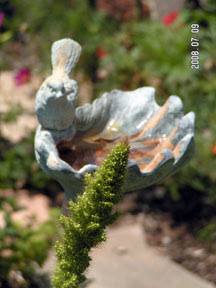They feature Angus beef from feedlots, factory-raised chicken, frozen cod, confinement-raised pork, hothouse-raised turkey, russet potatoes, genetically modified corn and soy, hybrid wheats and beer barley, iceberg lettuce, hydroponically grown Big Boy tomatoes, industrial-strength coffee, cola nut syrup, and cane sugar.“
from: Renewing America’s Food Traditions:
Saving and Savoring the Continent’s Most Endangered Foods
Edited by Gary Paul Nabhan
 Lots of talk these days about Victory Gardens. How it’s an idea whose time has come – back. Call it reviving a sustainable practice or hiding your head in nostalgia’s sand. Those thrilling days of yesteryear when Mom wore an apron over her shirtwaist dress and pearls, and when chemical bread fortified with 48 nutrients was a good thing.
Lots of talk these days about Victory Gardens. How it’s an idea whose time has come – back. Call it reviving a sustainable practice or hiding your head in nostalgia’s sand. Those thrilling days of yesteryear when Mom wore an apron over her shirtwaist dress and pearls, and when chemical bread fortified with 48 nutrients was a good thing.I’m sure Victory Gardens are a good thing. The problem that Victory Gardens pose to my blog is that this two-word topic is at the nexus of gardening and politics. In particular the politics of war, terror and global fear.
I try to grow what I eat because I like the taste. Because it is my personal stand against America’s corporate agricultural lobbies. Because I don't want poison in my food. Because I’m trying to get away from eating mass-produced, artificially fortified, genetically modified food. I do not cultivate my vegetable garden because of some twisted logic saying it’s the patriotic thing to do and supportthetroops.
If I try to blog on the subject of victory gardens, I fear my personal politics of gardening will be co-opted by my outrage that politics has co-opted gardening. I reject anything that might be yet another feeble flailing attempt to whip up support for the war. My blogging topics may reach critical mass and my politics will triumph over my gardening. I don’t have any magic insights into the politics of international (or intra-national) war and peace. The world needs another political blog almost as much as it needs my tomato bushes.
What I’m supposed to be blogging about is my continuing gardening education. I want to record my attempts to grow in understanding of the mysteries of growing one’s own food. I want to blog about how that wisdom seems to offer a way to my own peace. It’s way more than gardening. Maybe it’s gardenopoly (somebody else has probably copyrighted that word). Candide wasn’t speaking in a metaphor when he said cultivating our garden is the best of all possible worlds. I just want to cultivate MY garden for My reasons.
In all the talk of Victory Gardens, I’ve observed, there is something about a political advertising campaign, something about a certain mass appeal, or about how the campaigns sometimes read like talking points to brainwashed unwashed masses yearning to be proud and victorious against evil enemies. Grow a garden to help support the troops in some manner way too complex to explain to you. So this is why I won't garden for victory, or petition to grow a victory garden on the White House lawn.
 The last time Americans cultivated vegetable gardens as a political statements (first “Victory” - and second “Garden") was what my Dad called The War. Some have called it America’s last “good” war.
The last time Americans cultivated vegetable gardens as a political statements (first “Victory” - and second “Garden") was what my Dad called The War. Some have called it America’s last “good” war. It is therefore, pure coincidence that at this particular point in time, I decide to take a brief blog-cation. I’m going on vacation for two weeks. I’ll spend one week at a luxury resort with a day spa while Tech Support Guy waters the garden. He’s not politically, horticulturaly, or blog-ily inclined, so kids, get up, go outside, and play.
 Upon my return, the Democratic Convention will be over and maybe I’ll be able to hide in the Garden and ignore politics and opinions about Victory Gardens. I may be able to blog and garden until the regional fire season begins, or maybe even until the elections are over.
Upon my return, the Democratic Convention will be over and maybe I’ll be able to hide in the Garden and ignore politics and opinions about Victory Gardens. I may be able to blog and garden until the regional fire season begins, or maybe even until the elections are over. Meanwhile, and especially when you garden, remember the rallying cry of the Firesign Theater: “Shoes for Industry!”













































